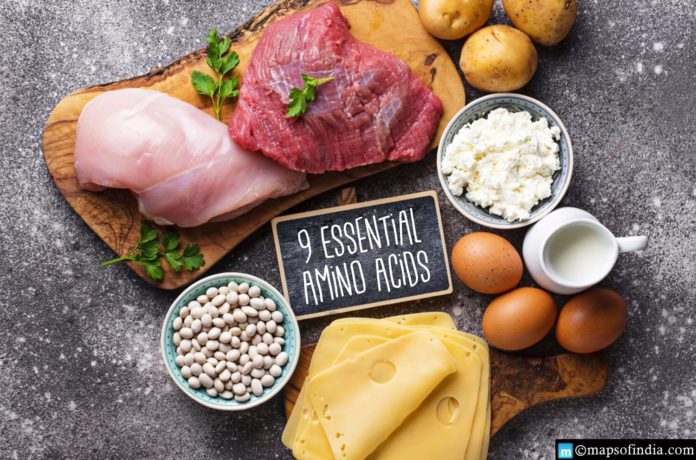Amino acids are those organic compounds composed of carbon, nitrogen, hydrogen, oxygen, and a variable side of the chain group. The human body needs 20 different amino acids to function and grow properly. All 20 amino acids are essential for health, but only nine amino acids are critical.
Animal proteins like meat, eggs and poultry are excellent sources of essential amino acids.
Role of amino acids in the human body:
The nine essential amino acids perform numerous vital roles in your body like:
Phenylalanine
Phenylalanine is a predecessor for tyrosine, dopamine, epinephrine and norepinephrine. In addition, phenylalanine plays a vital role in the structuring and functioning enzymes and proteins and the production of other amino acids.
Valine
Valine is one from one of the three branched-chain amino acids. It has a chain branching facing one side of its molecular structure. Valine helps to stimulate the growth of muscles and helps in regenerating cells that are involved in the production of energy.
Threonine
Threonine is a principal part of structural proteins such as elastin and collagen, known as essential components of the connective tissue and skin. It also plays a vital role in fat immune function and fat metabolism.
Tryptophan
It is often associated with causing drowsiness; tryptophan has many several functions. It helps maintain the proper nitrogen balance and is a predecessor to serotonin. Tryptophan is a neurotransmitter that helps to regulate appetite, sleep and mood.
Methionine
Methionine plays a vital role in detoxification and metabolising. It is also essential for tissue growth and to absorb the zinc and selenium minerals necessary for health.
Leucine
Leucine is a branched-chain amino acid-like valine needed for muscle repair and protein synthesis. In addition, leucine helps regulate blood sugar levels and stimulate wound healing. It also helps to produce growth hormones.
Isoleucine
It is the last of the three branched-chain amino acids. Isoleucine boosts muscle metabolism and is heavily concentrated in muscle tissue. Therefore, it is very important for a better immune function, production of haemoglobin, and energy regulation.
Lysine
Lysine plays a significant role in protein synthesis, hormone and enzyme production, and calcium absorption. It’s also important for energy production, immune function, and collagen and elastin production.
Histidine
Histidine is an amino acid that is used to produce histamine. It is a neurotransmitter essential for immune response, digestion, sexual function and sleep-wake cycles. It helps to maintain the myelin sheath. It is a protective barrier that surrounds the nerve cells.
Muscle loss is a common side effect of prolonged illnesses and bed rest, especially in older people.
These 9 Essential amino acids help prevent muscles from breakdown and maintain a lean body mass.




